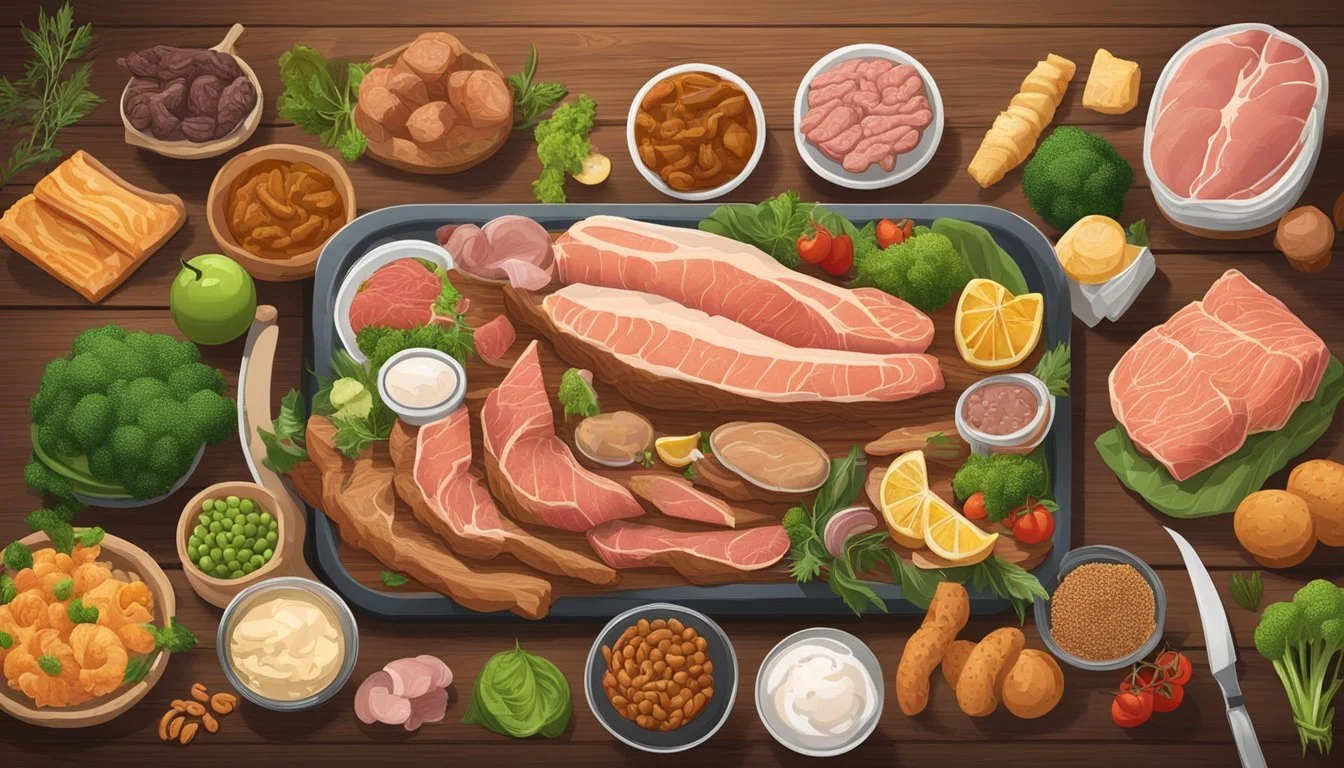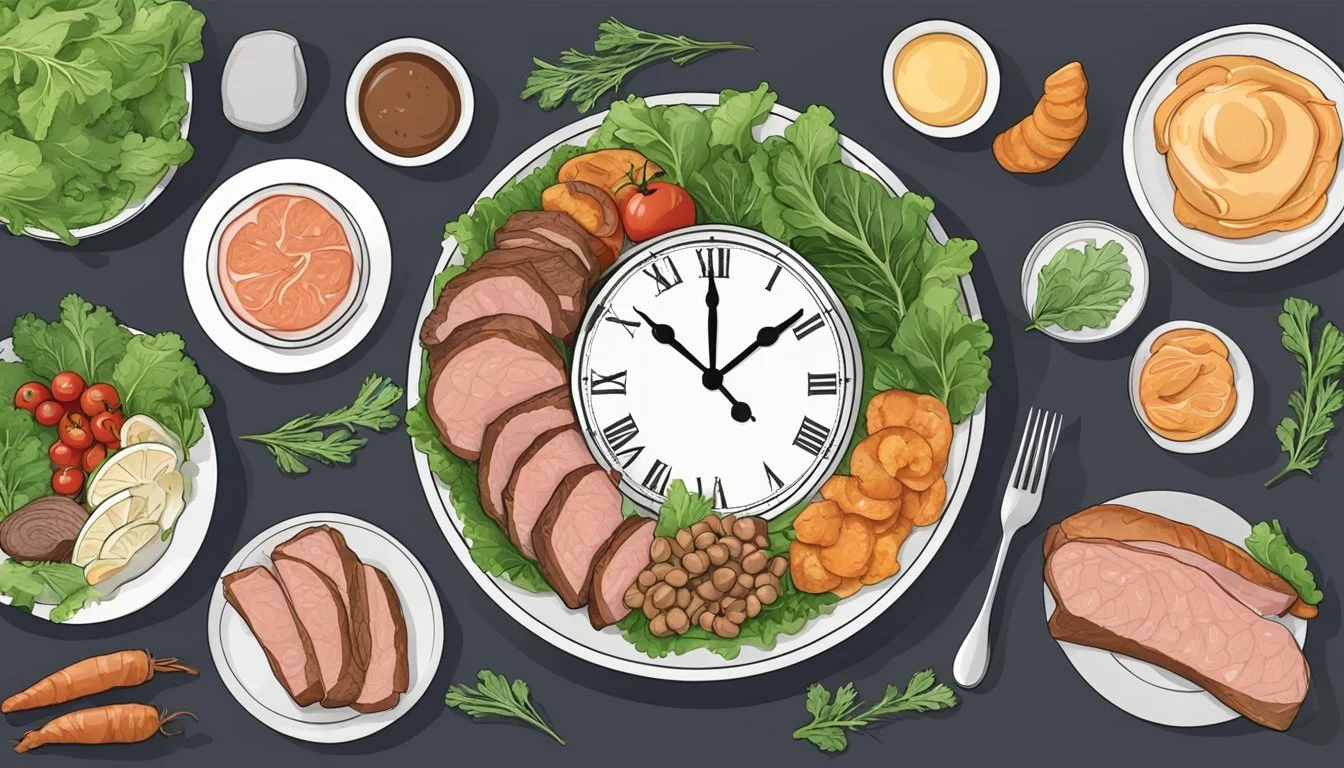Carnivore Diet and Meal Timing for Optimal Digestion
Strategies for Peak Health
The carnivore diet, an eating regime that includes exclusively animal products, is gaining attention for its potential impact on digestive health and overall well-being. By eliminating plant-based foods, this diet aims to reduce digestive discomfort and inflammation, positioning itself as a unique solution for individuals seeking digestive relief. With a focus on meats, seafood, eggs, and certain dairy products, adherents consume high-protein and high-fat meals, which may streamline digestion by removing fibrous and potentially irritating plant foods.
Meal timing on the carnivore diet could augment its digestive benefits. Eating patterns are tailored to capitalize on times of day when insulin sensitivity is highest, generally around midday, to optimize nutrient absorption and maintain stable energy levels. Late-night or very early morning meals are discouraged as they may coincide with lower insulin sensitivity and could potentially disrupt the digestive process.
Adapting to the carnivore diet involves a degree of personalization, where individuals need to be in tune with their body's reactions to dietary changes. Monitoring body signals following meal consumption is crucial, as one's optimal eating schedule may differ based on personal metabolic rhythms and digestive capacity. This self-aware approach ensures the diet aligns with the health goals and digestive comfort of those who choose to follow it.
Understanding the Carnivore Diet
The Carnivore Diet is a high-protein, low-carbohydrate diet focusing on animal products and eliminating plant-based foods. It is grounded in the belief that human digestive systems are optimized for animal-based nutrition.
Origins and Principles
The Carnivore Diet stems from the hypothesis that early humans thrived on a meat-centric diet. Principles behind this diet are simplicity and returning to what proponents consider a more 'natural' way of eating—relying on animal products, particularly meat, as the primary source of nutrition. This approach suggests encouraging consumption of meats and byproducts to deliver necessary nutrients without the need for plant-based foods.
Foods to Include and Avoid
Meat: Includes all forms of red meat (What wine goes well with red meat?) (beef, pork, lamb, game), poultry, and white meat such as chicken and turkey.
Seafood: Encourages fatty fish like salmon and mackerel as well as other seafood.
Organ Meat: Liver, kidney, and bone marrow are valued for their nutrient density.
Eggs: Chicken, duck, and goose eggs.
Dairy: Focuses on high-fat, low-lactose options like butter, heavy cream, and hard cheeses.
Foods to Avoid:
All plant-based foods, including fruits, vegetables, legumes, grains, nuts, and seeds.
High-lactose dairy products.
Any processed foods not derived directly from animal sources.
Benefits of Carnivore Diet
Advocates of the diet claim numerous health benefits, such as improved digestion due to the focus on easily digestible animal proteins and fats. The emphasis on meats and eggs ensures a robust intake of nutrients such as vitamin B12, iron, and essential amino acids. However, as with any restrictive diet, individuals should consider potential risks and consult healthcare professionals to ensure nutritional needs are met.
Meal Timing Fundamentals
In the context of a Carnivore Diet, understanding meal timing is pivotal for optimizing digestion, nutrient absorption, and maintaining energy levels, which can influence overall performance.
Importance of Timing for Digestion
Meal timing can significantly affect the digestive process. For individuals on a Carnivore Diet, spacing meals appropriately allows the digestive system sufficient time to break down high-protein and high-fat foods, which are typically more taxing to digest. Consuming meals at regular intervals can help prevent indigestion and stomach discomfort that may arise from overburdening the digestive tract.
Food Absorption and Nutrient Utilization
The timing of meals also intersects with the body's ability to absorb and utilize nutrients. Proteins and fats, the cornerstones of the Carnivore Diet, have different rates of absorption. Consuming these foods at strategic times throughout the day ensures that the body has a steady supply of amino acids and fatty acids, vital for muscle repair and energy. For instance, including a protein-rich meal post-exercise can enhance recovery due to the increased demand for amino acids.
Impact on Energy and Performance
The synchronicity of meal timing with the body's natural circadian rhythm plays a role in energy levels and physical performance. Eating larger meals earlier in the day when the metabolism is more active, and reducing intake as the day progresses, can lead to more consistent energy levels. This is because the body tends to be more efficient at processing food when it aligns with peak daylight hours, which corresponds to higher melatonin levels and activity periods.
Daily Meal Planning
Adhering to a well-structured meal plan is vital for those on the Carnivore Diet to ensure they meet their nutritional needs and digest food optimally. Timing is crucial for maximizing energy levels and supporting recovery.
Structuring Your Day
Individuals should begin their day with a high-protein breakfast that aligns with the Carnivore Diet's emphasis on meat and animal products. An example of a breakfast meal could be a serving of beef patties or eggs. Planning ahead for lunch is equally important; it typically involves a moderate portion of animal-based protein such as chicken or fish to sustain energy throughout the day.
Here's a simple structure for daily meal planning:
Breakfast: 8:00 AM – Beef patties or eggs
Lunch: 12:00 PM – Chicken breast (What wine goes well with chicken breast?) or fish fillet
Pre-Workout and Post-Workout Meals
For those incorporating exercise into their routine, pre-workout meals should be consumed about 1-2 hours prior to exercising and consist of easily digestible proteins like a lean cut of steak or eggs for sustained energy release. Post-workout meals are crucial for recovery and should be eaten within an hour of exercising. They need to be richer in proteins and fats, such as a ribeye steak (What wine goes well with ribeye steak?), to aid in muscle repair and recovery.
Example Pre- and Post-Workout Meals:
Pre-Workout (1-2 hours before): A lean cut of steak
Post-Workout (within 1 hour): Ribeye steak
Dinner Considerations for Recovery
Dinner is an essential meal for recovery, especially after a day of physical activity. It should contain a hearty portion of red meat or a similarly dense protein source like pork or lamb, combined with good fats to facilitate nutrient absorption and muscle rebuilding during sleep.
Sample Dinner Meal:
Dinner: 7:00 PM – Grilled lamb chops (What wine goes well with lamb chops?) with a side of bone marrow
These meal plans are only examples, and one should listen to their body and adjust meal sizes and timings for personal success and comfort.
Dietary Fat and Protein Focus
The carnivore diet emphasizes high intake of animal proteins and fats with a particular attention to the types of fats consumed and the role of proteins in the body. This approach suggests a focus on a variety of meat sources to provide a spectrum of nutrients.
Types of Fats in Carnivore Diet
Saturated Fats: Predominant in the carnivore diet, found in abundance in red meat like steak and pork. Saturated fats are crucial for building cell membranes and hormones.
Monounsaturated Fats: Present in meats like chicken and pork, these fats are beneficial for heart health and can be obtained by including different types of meat in the diet.
Polyunsaturated Fats: Fish, especially fatty types like salmon, are a source of omega-3 fatty acids, a type of polyunsaturated fat important for brain function and inflammation reduction.
Role of Protein in Muscle Maintenance
Proteins are the building blocks of muscles, and the carnivore diet provides high-quality animal proteins necessary for muscle repair and growth. Consuming enough protein is essential for people involved in resistance training or looking to maintain muscle mass. Sources such as chicken, fish, and steak are excellent for this purpose.
Including Variety of Meat Sources
Red Meat: Sources like steak represent a rich source of protein and B vitamins, but should be balanced with other meats.
Poultry: Chicken provides a lean protein source and can be included regularly.
Fish: Adds essential fatty acids and variety to protein sources within the carnivore diet.
Organ Meats: Highly nutritious parts like liver provide a concentrated source of vitamins and minerals, such as vitamin A and iron.
Bone Marrow: Consuming bones in the form of bone broth can offer collagen, which supports joint and skin health.
By incorporating different animal products, individuals can ensure a broad nutrient profile, which is important for overall health while following a carnivore dietary pattern.
Nutritional Considerations
The Carnivore Diet emphasizes a high intake of animal-based foods, often necessitating a closer look at vitamins and minerals and the potential need for supplements to maintain balanced nutrition.
Vitamins and Minerals in Carnivore Diet
Animal-based foods within the Carnivore Diet, particularly organ meats, are rich sources of nutrients. Organ meats such as liver and kidney are packed with vitamins A, D, E, and K, as well as a full spectrum of B vitamins. They also provide essential minerals like iron, zinc, selenium, and copper. Including grass-fed meat options can enhance the intake of omega-3 fatty acids compared to grain-fed counterparts.
Addressing Potential Nutrient Deficiencies
A strict Carnivore Diet may lack certain nutrients found in plant foods. For instance, Vitamin C is commonly associated with fruits and vegetables. However, one can obtain vitamin C from organ meats, although in lower amounts. Another concern is fiber, which is absent in animal products, but necessary for digestion. Moreover, there is a potential deficiency in antioxidants and phytonutrients that support overall health and are not present in the diet.
Supplementation Recommendations
Individuals on the Carnivore Diet should consider supplements to fill nutritional gaps. Nutrients of concern may include:
Vitamin C: Although present in organ meats, a supplement can ensure adequate levels.
Calcium: Generally sourced from dairy, those who avoid dairy on a Carnivore Diet may need a supplement.
Fiber: Since animal products do not contain fiber, a supplement can help support digestive health.
Magnesium and Potassium: These minerals are crucial for muscle function and other bodily processes and may need to be supplemented if not obtained through diet.
Including bone marrow can offer additional nutritional value, including fat-soluble vitamins and minerals. However, a healthcare provider should be consulted before starting any new supplements.
If you can’t find these supplements in your local markets, you can order Vitamin C, Calcium, Fiber, Magnesium, and Potassium online!
Carnivore Diet for Weight Management
The Carnivore Diet is gaining attention for its potential benefits in weight management, notably through mechanisms like fat adaptation and appetite control.
Weight Loss and Fat Adaptation
Fat Adaptation: Individuals may experience weight loss on the Carnivore Diet as their bodies become fat-adapted. This state of ketosis occurs when the body begins to use fat for fuel instead of carbohydrates, due to the diet's low-carb nature. Here are the steps in fat adaptation:
Carbohydrate restriction leads to reduced insulin levels.
The body starts to mobilize fat stores for energy.
The liver converts fats into ketones, substances that can be used by cells for energy.
Duration for Adaptation: Typically, the transition to fat adaptation can take several weeks.
Satiety and Appetite Control
Satiety: The Carnivore Diet can enhance feelings of fullness because of its high protein content, which is known to be more satiating than carbohydrates. This is how protein contributes to satiety:
Protein affects hunger hormones, such as ghrelin.
It promotes a feeling of fullness, reducing the overall caloric intake.
Appetite Control: The absence of sugar and refined carbohydrates helps to stabilize blood sugar levels, which can result in more controlled eating patterns and reduced cravings. They benefit from maintaining a stable energy supply without the peaks and troughs typically associated with high-carb diets.
Digestive Health and Carnivore Diet
When adopting a carnivore diet, individuals must consider the impacts on digestive health, namely the gut microbiome and inflammation. Understanding how this diet affects these areas is crucial for maintaining a healthy digestive system.
Impact on Gut Microbiome
The gut microbiome consists of trillions of bacteria, playing an essential role in digestion and overall health. A carnivore diet alters the gut microbiome by significantly reducing the diversity of bacteria, as it eliminates fiber from plant sources that feed a broad spectrum of these microorganisms. The long-term effects of this shift are not fully understood, but an individual embarking on a carnivore diet should monitor their gut health and consider probiotic supplementation to support a balanced microbiome.
Gut Microbiome Composition Pre-Carnivore Diet:
Diverse bacteria populations
Supported by plant-based fibers
Gut Microbiome Composition on Carnivore Diet:
Reduced bacteria diversity
Lack of fiber may impact bacterial balance
Reducing Inflammation and Digestive Issues
The carnivore diet has been proposed to help reduce inflammation and alleviate digestive issues for some individuals. Eliminating plant-based foods removes certain dietary components, namely fiber, which in some cases can cause bloating or irritation. The diet may reduce inflammatory markers in individuals who have sensitivities to certain plant compounds, but there is limited research to confirm the breadth of this effect. Personal experiences vary, and one should approach this diet with caution and under medical supervision, especially if they have pre-existing digestive conditions.
Potential Reduction in Inflammatory Markers:
Limited data available
Anecdotal reports suggest improvements for certain individuals
Considerations for Sensitive Individuals:
Elimination of certain plant compounds that can cause irritation
Personalized medical supervision recommended
Challenges and Solutions
Adopting a carnivore diet can present unique challenges, particularly when it comes to meal timing and digestive health. This section offers practical solutions for navigating social settings, overcoming common obstacles, and dispelling myths associated with this dietary approach.
Handling Social Settings and Dining Out
When one adopts a carnivore diet, dining out or attending social gatherings can be challenging due to limited menu options. It's vital to plan ahead by reviewing menus online or calling restaurants to inquire about carnivore-friendly dishes. Selecting steakhouses or grill-centric restaurants often provides the most flexibility. When attending social events, one might consider eating beforehand or bringing their own carnivore-approved foods to avoid inconvenience.
Tips for Dining Out:
Contact restaurants ahead of time to ensure they can accommodate the diet.
Focus on simple dishes such as grilled meats or seafood platters.
Avoid sauces and dressings as they may contain non-carnivore ingredients.
Overcoming Common Obstacles
Transitioning to a carnivore diet may result in initial physical discomfort, such as fatigue or digestive changes. Staying hydrated is essential, and one should drink water consistently throughout the day. If constipation occurs, incorporating natural sources of animal-derived fats can aid in digestion. It's also constructive to experiment with the inclusion of different cuts of meat to ensure a variety of nutrients.
Common Issues and Solutions:
Dehydration: Increase water intake.
Digestion Concerns: Adjust fat-to-protein ratios and include various meat cuts.
FAQs and Myths about Carnivore Diet
Understandably, people often have questions about the carnivore diet. Common inquiries involve its impact on health and digestion. Healthcare providers can offer personalized advice, ensuring the diet is followed safely. It's important to verify information, as myths can lead to confusion. For example, contrary to popular belief, a well-designed carnivore diet plan can offer adequate vitamins and minerals.
Selected FAQs:
Is a carnivore diet deficient in fiber? Animal products do not contain fiber, yet some individuals report improved digestion due to the elimination of irritants found in plant-based foods.
Can I only eat meat? A carnivore diet primarily consists of animal products, including meat, fish, eggs, and certain dairy items.
When considering meal timing for optimal digestion on a carnivore diet, individuals should pay close attention to their body's reactions and consult a healthcare provider when necessary.
Recipes and Meal Ideas
The Carnivore Diet emphasizes simplicity, focusing on animal products while eliminating plant-based foods. This section provides practical recipes, indispensable kitchen tools, and tips for maintaining variety in meal planning.
Simple Carnivore-Friendly Recipes
Recipes on the Carnivore Diet are straightforward, primarily involving meat with few additional ingredients. Here are some recipes that anyone can easily replicate:
Ribeye Steak (What wine goes well with ribeye steak?): Season a ribeye steak with salt and cook it in a preheated skillet over high heat. Sear each side for a few minutes until a crust forms and the steak reaches the desired level of doneness.
Ground Beef Patties: Combine ground beef with salt and form into patties. Grill or pan-fry until fully cooked, and serve with a side of fried eggs for added protein.
Bacon and Eggs: Fry slices of bacon until crispy. In the rendered bacon fat, cook eggs to your preference—scrambled, fried, or poached.
Cheese Omelet: Whisk eggs and pour into a skillet, then sprinkle shredded cheese of choice. Fold the omelet and cook until the cheese melts and the eggs are set.
Enjoy the convenience of doorstep delivery when you buy an electric grill online!
Essential Kitchen Tools
To prepare Carnivore Diet recipes effectively, one requires a set of essential kitchen tools. Notable mentions include:
Cast Iron Skillet: Ideal for searing meats and withstanding high temperatures.
Meat Thermometer: Ensures meats are cooked to the correct temperature for safety and preference.
Sharp Knives: Essential for cutting and preparing meats efficiently.
Online shopping for cast iron skillet, meat thermometer, and sharp knives is the smart choice for a seamless transaction!
Creating a Diverse Meal Roster
Maintaining a diverse meal roster on a Carnivore Diet can be challenging but not impossible. Incorporating a variety of meats such as chicken, fish, and organ meats can keep meals interesting. Here's how one can diversify their diet within the Carnivore framework:
Monday: Grilled Chicken: Season chicken breasts with salt and cook on a grill until the internal temperature reaches 165°F.
Tuesday: Fish with Cream Cheese Sauce: Pan-fry a fillet of salmon and serve with a sauce made from cream cheese, enhancing it with herbs if desired.
Wednesday: Beef Roast: Slow cook a beef roast in a crockpot with sea salt until tender and juicy.
Thursday: Pork Chops: (What wine goes well with pork chops?) Season pork chops with salt and cook in a skillet until they reach an internal temperature of 145°F.
Friday: Organ Meats: Prepare liver or heart with seasoning and cook them to broaden nutrient intake.
By rotating these meats and preparation methods, one can enjoy a variety of flavorful meals while adhering to the Carnivore Diet guidelines.
Take advantage of the wide variety of online options when shopping for a slow cooker!


















